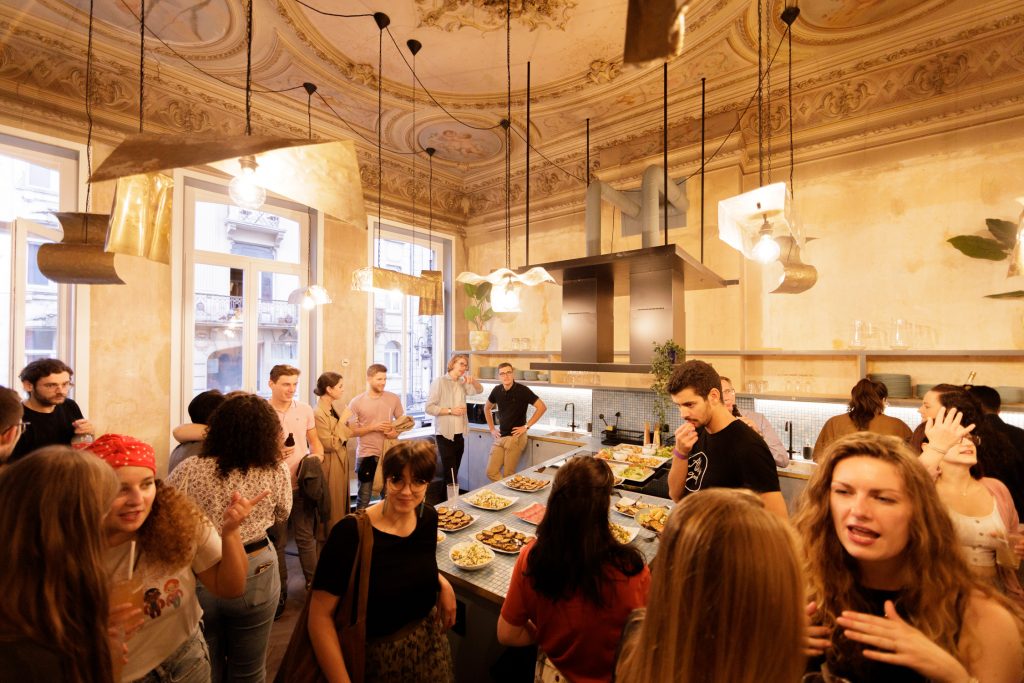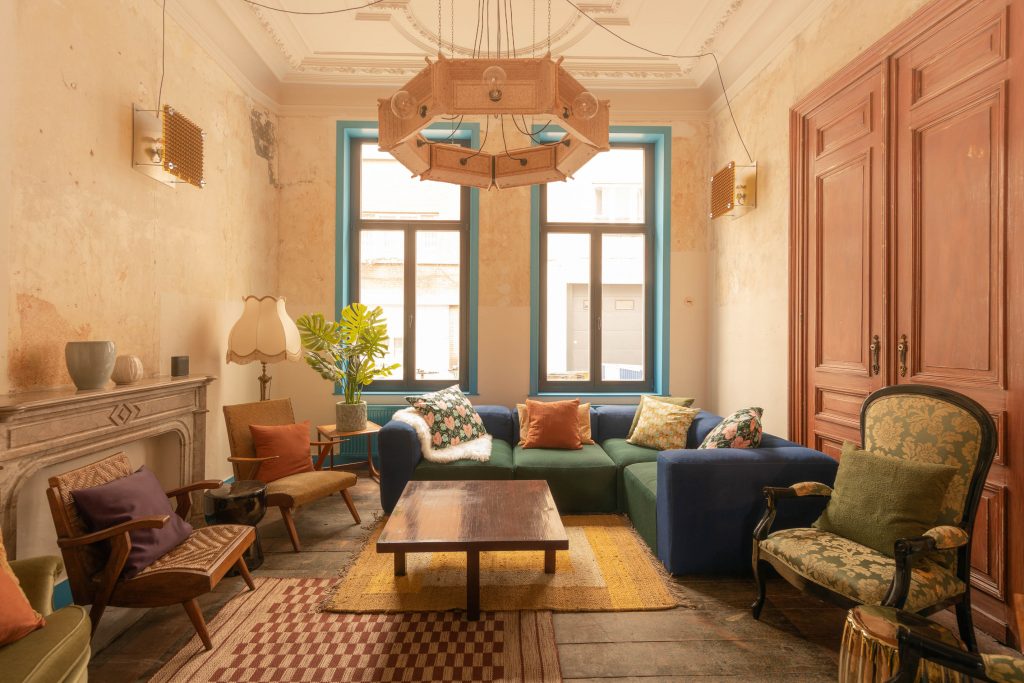How to transition from living alone to a coliving community in Brussels
Living alone can offer independence and freedom, but it can also lead to feelings of isolation and disconnectedness. If you're looking for a way to break out of this cycle, transitioning to a coliving community may be just the solution you need. Coliving offers a unique opportunity to form connections with others and find a sense of belonging. Plus, with its vibrant culture, rich history, and bustling city life, Brussels provides the perfect backdrop for your new adventure. Although transitioning to coliving may seem intimidating, it doesn't have to be. In this article, we will explore some tips and tricks to help you make the transition as smooth and stress-free as possible.
Coliving in Brussels
Living in Brussels is a unique experience, offering a range of benefits that are hard to find elsewhere. The city is incredibly cosmopolitan and diverse, making it a hub for international organizations and expats from around the world. This diversity is reflected in the coliving communities in the city, which are home to people from all walks of life. Another benefit of coliving in Brussels is the city's excellent infrastructure. With a reliable public transport system and bike-friendly streets, getting around the city is a breeze. However, since the city is also known for its lively nightlife, it's important to find a coliving community that offers a balance between work and play. A good coliving community should provide opportunities for socializing and networking while also allowing residents to focus on their work and personal goals.
Factors to consider when choosing a coliving community
When choosing a coliving community, there are several factors to consider. First, you should think about the location of the community and how convenient it is for your daily needs. You should also evaluate the types of amenities and services that are available, such as co-working spaces, gyms, and communal areas. It’s also important to assess the community's values and culture to ensure that it aligns with your own. Finally, you should evaluate the cost of living in the community and compare it to other options in the area.
Researching different communities in Brussels
It's crucial to research different coliving options before making a decision. Joining online groups and forums of like-minded individuals can be a great way to get a sense of the different communities available. For those who are new to Brussels, Facebook groups like Expats living and working in Brussels and Expats in Brussels can be especially helpful. These groups offer a wealth of information on living in Brussels, as well as the opportunity to connect with other expats who may have already gone through the process of finding a coliving community. Additionally, be sure to read reviews of different communities online. This will give you a sense of the experiences of previous residents, as well as any potential issues or concerns that have been raised.

Preparing for the Transition
Creating a budget
To ensure that you can afford the costs associated with living in a shared space and avoid unnecessary financial stress, creating a budget is always a good idea. Start by calculating your monthly income and expenses, including rent, utilities, food, transportation, and any other expenses you might have. Once you have a clear understanding of your expenses, you can allocate a budget for coliving that is within your means. Keep in mind that the cost of living in a coliving community can vary depending on factors such as location, amenities, and the size of the room. To get a better sense of what to expect, you can check out Numbeo's guide on the Cost of Living in Brussels.
Downsizing and decluttering
Before moving to a shared space, it's important to evaluate your belongings and determine what you need and what you can do without. You may need to sell, donate, or discard items that you no longer use or that won't fit in your new living space. To help you declutter, consider using online platforms like Facebook Marketplace, Troc.com, and 2ememain.be to sell or get rid of items that you won’t be bringing with you. This can be a great way to earn some extra money and clear out space before the move. By downsizing and decluttering before your move, you'll be able to start fresh, reduce moving stress and make the transition to living in a coliving community more manageable and enjoyable.
Mental preparation for communal living
Living in a shared space means sharing common areas, such as the kitchen, living room, and bathrooms, with other people. It also means that you will have to adjust your lifestyle to accommodate your housemates' needs and preferences. Mental preparation is essential for this transition, as it can be challenging to adapt to communal living if you are used to living alone. You should approach this change with an open mind, a willingness to adapt, and an attitude of empathy, respect, and kindness toward your housemates.
One way to show that you care about your new environment and the people in it is to learn some basic French or Dutch. Not only will it help you communicate more effectively with your housemates, but it can also help you integrate into the local community and culture. This can lead to a richer experience, making it easier to make new friends and explore the city.
Belgians are known for their love of food, and sharing a meal is an excellent way to bond with your housemates. Learning a traditional dish and sharing it with them can show that you are invested in the culture and can also help break the ice. It also provides an opportunity for your housemates to share their favorite dishes with you, leading to cultural exchange and potentially discovering new foods.
Making a list
Moving to a new city and a new living situation can be overwhelming, but making a list can help you stay organized and ensure that nothing important is forgotten. Make a list of necessary items to bring, including clothes, toiletries, and any personal belongings that are important to you. Also, make a list of necessary documents to prepare, such as a passport, visa, travel insurance, and any other paperwork that may be required. It's important to check the visa requirements for your specific situation as early as possible, as some visas may take time to process.
Lastly, make a list of things you need to get done before leaving, such as selling or getting rid of belongings, letting your landlord know, forwarding your mail, and other necessary preparations.
It's also important to note that if you are leaving an apartment in Belgium, leases are not always flexible. In Belgium, a lease is considered short-term when it is valid for 6 months to 3 years. To terminate a short-term lease, you must give at least a 3 months notice before the end date of the lease. For more information on rental agreements, you can consult Housing Anywhere's guide on Renting in Belgium.
Making the move
Moving logistics and tips
Depending on where you're moving from, you may need to organize your visa, travel insurance, and other paperwork. You'll also need to think about how you'll transport your belongings to your new home. If you are moving from within the Brussels area will you rent a truck or hire a moving company? And if you are moving from abroad will you pack them in a suitcase or ship them to Brussels? It's important to research your options and plan accordingly.

Another crucial step is to familiarize yourself with the coliving community's policies and procedures. Make sure you understand the move-in process, including the date and time you can move in and any special arrangements you need to make. Taking the time to understand these policies will ensure a smoother transition and help you settle into your new home in Brussels. Finally, don't hesitate to communicate with the community manager about any questions or concerns you may have. The manager is there to help you have a positive experience, so feel free to reach out for support as needed.
Meeting and getting to know your new housemates
One of the most exciting aspects of living in a coliving community is the opportunity to meet new people from a variety of backgrounds. Once you've moved in, take the time to introduce yourself to your housemates and get to know them. You can start by simply saying hello and striking up a conversation in the common areas. Try to be open-minded and curious about their interests and cultures.

To get more involved, ask your housemates about events and activities that are organized within the community or in Brussels. Additionally, don't hesitate to invite your housemates to join you in activities that you enjoy. For example, if you're a fan of running or biking, you can ask them to accompany you for a stroll in The Royal Park or Bois de la Cambre. By engaging in activities together, you can build deeper bonds and create a strong sense of community.
Establishing ground rules and expectations
Living in a coliving community can be a new and sometimes challenging experience, especially for those who have never shared a living space with others before. It's important to be mindful of your surroundings and respectful of your housemates' personal space. Before moving in, make sure to familiarize yourself with the rules and guidelines of the coliving community. Knowing what to expect will help you feel more at home once you arrive.
Living in a Coliving Community
Benefits of coliving in Brussels
There are many benefits to coliving in Brussels. First and foremost, coliving provides an excellent opportunity to immerse oneself in the city's vibrant culture and social scene. With so many opportunities to meet new people and explore new places, this lifestyle can be a great way to broaden your horizons and expand your social circle.
Coliving also offers flexibility, with many communities offering short-term leases and the ability to move in and out as needed. In addition, coliving can provide networking and career opportunities, as many communities host events and workshops designed to help residents grow personally and professionally. At Cohabs, we offer convenient and flexible coliving options for people looking to live, work, and play comfortably for a duration of six months to a year. We take a community-driven approach and organize monthly events, dinners, and parties to create a vibrant social network. These events also provide opportunities for networking and career growth.
Challenges of communal living and how to address them
Living in a coliving community can come with some challenges. Sharing spaces with others means adapting to different living styles and habits, which can take some getting used to. It's important to be mindful of noise levels, cleanliness, and personal boundaries. Communication is key to addressing any issues that may arise, and it's best to approach conflicts in a calm and respectful manner. Some coliving spaces offer conflict resolution assistance, which can be helpful in finding a mutually agreeable solution.

It's important to note that Brussels is very diverse, and you might encounter big differences in lifestyles within the community. Coliving often means accepting living in a multicultural environment and learning to appreciate and celebrate those differences. Remember, you're living in a community, so don’t forget to be considerate of your roommates and fellow residents. It's always important to respect each other's lifestyles, values, privacy, and personal space and to be thoughtful of others when using shared resources. By keeping these things in mind, everyone can feel comfortable and happy in their communal living space.
Final thoughts on how to make the transition
In conclusion, coliving in Brussels is an excellent way to experience the city while building new connections and friendships. You’ll find that this flexible lifestyle appeals to a wide range of people, from professionals to students and digital nomads. While the transition to communal living isn’t always easy, it offers many benefits such as a supportive community, flexible lease terms, built-in social networks, and the opportunity to connect with others from a variety of backgrounds.
Living in Brussels is a great option because of its central location in Europe, vibrant culture, historical significance, and numerous personal and professional opportunities. It's a city with a high quality of life and is welcoming to people from all backgrounds. At times, communal living can present challenges that require patience, empathy, and communication, but with the right mindset and a willingness to adapt, the experience of coliving in Brussels can be both rewarding and unforgettable.